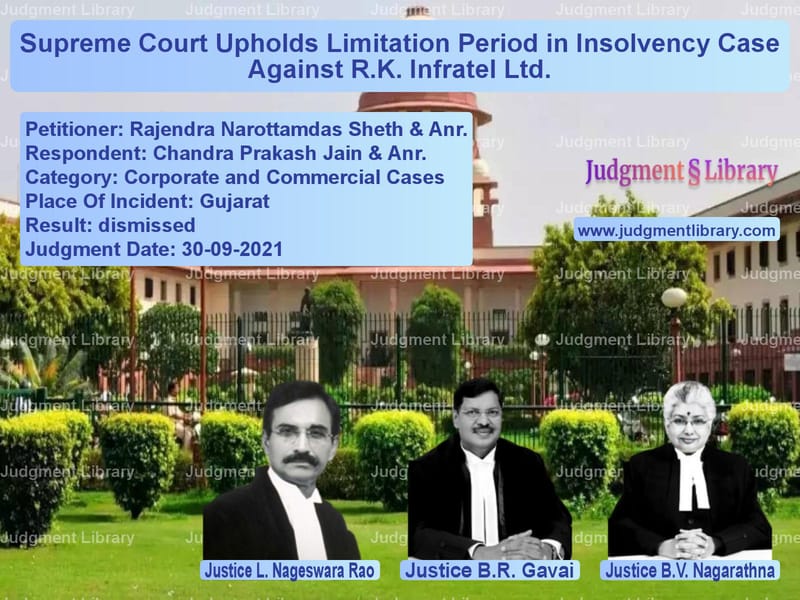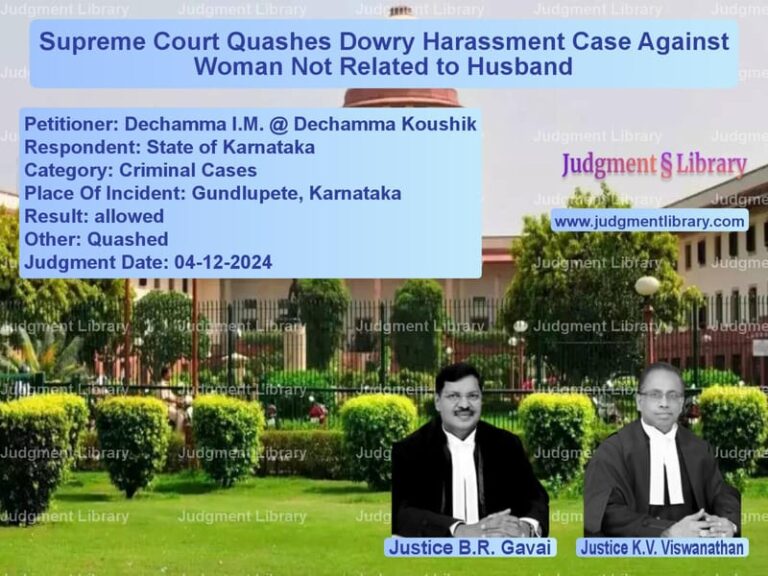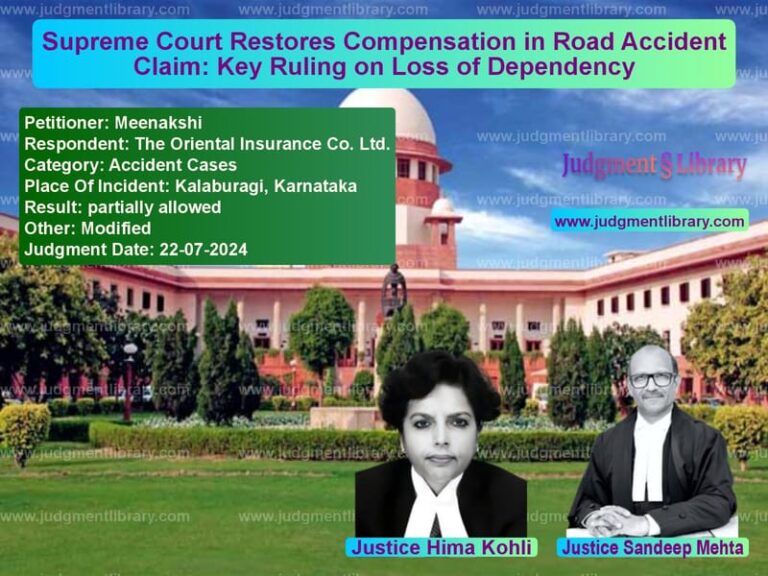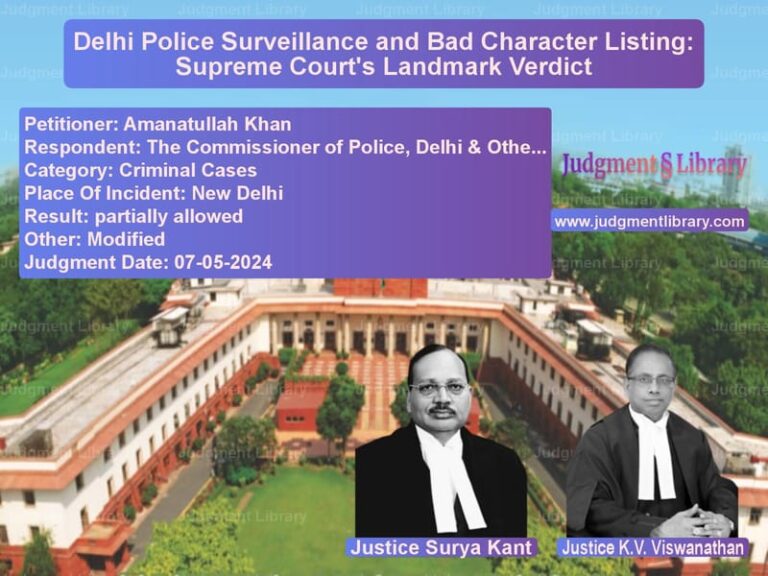Supreme Court Upholds Limitation Period in Insolvency Case Against R.K. Infratel Ltd.
The case of Rajendra Narottamdas Sheth & Anr. v. Chandra Prakash Jain & Anr. revolves around the initiation of corporate insolvency proceedings against R.K. Infratel Ltd. The Supreme Court examined whether an application filed under Section 7 of the Insolvency and Bankruptcy Code (IBC), 2016 was within the prescribed limitation period and whether a power of attorney holder could validly file such an application.
Background of the Case
R.K. Infratel Ltd. (the ‘Corporate Debtor’) was engaged in setting up an underground fiber network in various cities across Gujarat, providing internet leased lines and surveillance services. The company availed financial assistance from Union Bank of India (the ‘Financial Creditor’). Despite repaying some loans, the Corporate Debtor defaulted on its dues, leading to the classification of its account as a Non-Performing Asset (NPA) on September 30, 2014. The bank initiated recovery proceedings before the Debt Recovery Tribunal, Ahmedabad, under the Recovery of Debts Due to Banks and Financial Institutions Act, 1993.
Subsequently, on April 25, 2019, the Financial Creditor filed an application under Section 7 of the IBC before the National Company Law Tribunal (NCLT), Ahmedabad, claiming an outstanding amount of ₹24.62 crore as on March 31, 2019. The application was admitted by NCLT on June 1, 2020. The Corporate Debtor challenged this order before the National Company Law Appellate Tribunal (NCLAT), which dismissed the appeal, prompting the present appeal before the Supreme Court.
Read also: https://judgmentlibrary.com/corporate-dispute-over-shares-supreme-court-upholds-nclat-ruling/
Key Issues Before the Supreme Court
- Whether the application under Section 7 of IBC was barred by limitation.
- Whether the power of attorney holder was competent to file the application.
Arguments by the Appellants (Corporate Debtor)
The Corporate Debtor contended that:
- The date of default was September 30, 2014, and the application under Section 7 of IBC was filed on April 25, 2019, exceeding the three-year limitation period.
- The payments made after the account was declared as NPA could not extend the limitation period.
- The application was filed by a power of attorney holder, which was impermissible under the IBC.
Arguments by the Respondents (Financial Creditor)
The Financial Creditor countered that:
- The Corporate Debtor had issued a debit balance confirmation letter on April 7, 2016, and continued to acknowledge its debt until 2019, thereby extending the limitation period under Section 18 of the Limitation Act, 1963.
- The application was filed by a duly authorized officer of the bank under a power of attorney.
- There was no error in NCLT’s decision to admit the application.
Supreme Court’s Analysis
The Supreme Court, comprising Justices L. Nageswara Rao, B.R. Gavai, and B.V. Nagarathna, analyzed both issues concerning the limitation period and the validity of the application filed by a power of attorney holder.
Key Findings
- Limitation Period: The Court held that the acknowledgment of liability in letters issued by the Corporate Debtor in 2016, 2018, and 2019 extended the limitation period under Section 18 of the Limitation Act.
- Power of Attorney Holder: The Court ruled that a power of attorney holder could file an application under Section 7 of the IBC, provided the authorization was sufficiently broad.
Key Observations by the Supreme Court
“Any suit, appeal, or application filed after the prescribed period of limitation shall be dismissed, even if limitation is not set up as a defense.”
“Acknowledgment of liability before the expiration of the limitation period extends the limitation by a fresh period of three years.”
Final Judgment
The Supreme Court ruled:
- The NCLT was correct in admitting the application under Section 7 of the IBC.
- The acknowledgment of debt in various letters extended the limitation period, making the application timely.
- The power of attorney holder was validly authorized to initiate the proceedings.
- The appeal was dismissed, upholding the initiation of insolvency proceedings against R.K. Infratel Ltd.
Implications of the Judgment
This ruling has several key implications:
- Strict Adherence to Limitation Laws: The judgment confirms that limitation laws must be strictly followed in insolvency cases.
- Power of Attorney in IBC Cases: The ruling clarifies that financial institutions can authorize officers through a power of attorney to file IBC applications.
- Impact on Debt Recovery: Banks and financial institutions must maintain updated acknowledgment records to ensure their claims remain enforceable.
Conclusion
The Supreme Court’s ruling in Rajendra Narottamdas Sheth v. Chandra Prakash Jain reaffirms the importance of following procedural and limitation requirements in insolvency proceedings. The decision provides clarity on the role of power of attorney holders in IBC cases and ensures that financial creditors can rely on acknowledgment of debt to extend limitation periods.
Petitioner Name: Rajendra Narottamdas Sheth & Anr..Respondent Name: Chandra Prakash Jain & Anr..Judgment By: Justice L. Nageswara Rao, Justice B.R. Gavai, Justice B.V. Nagarathna.Place Of Incident: Gujarat.Judgment Date: 30-09-2021.
Don’t miss out on the full details! Download the complete judgment in PDF format below and gain valuable insights instantly!
Download Judgment: rajendra-narottamdas-vs-chandra-prakash-jain-supreme-court-of-india-judgment-dated-30-09-2021.pdf
Directly Download Judgment: Directly download this Judgment
See all petitions in Bankruptcy and Insolvency
See all petitions in Judgment by L. Nageswara Rao
See all petitions in Judgment by B R Gavai
See all petitions in Judgment by B.V. Nagarathna
See all petitions in dismissed
See all petitions in supreme court of India judgments September 2021
See all petitions in 2021 judgments
See all posts in Corporate and Commercial Cases Category
See all allowed petitions in Corporate and Commercial Cases Category
See all Dismissed petitions in Corporate and Commercial Cases Category
See all partially allowed petitions in Corporate and Commercial Cases Category







